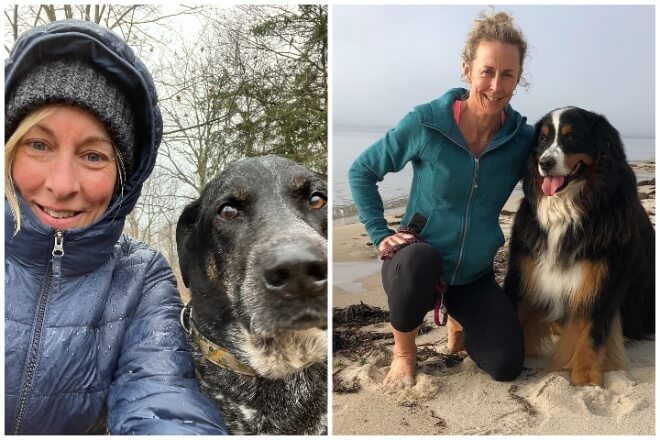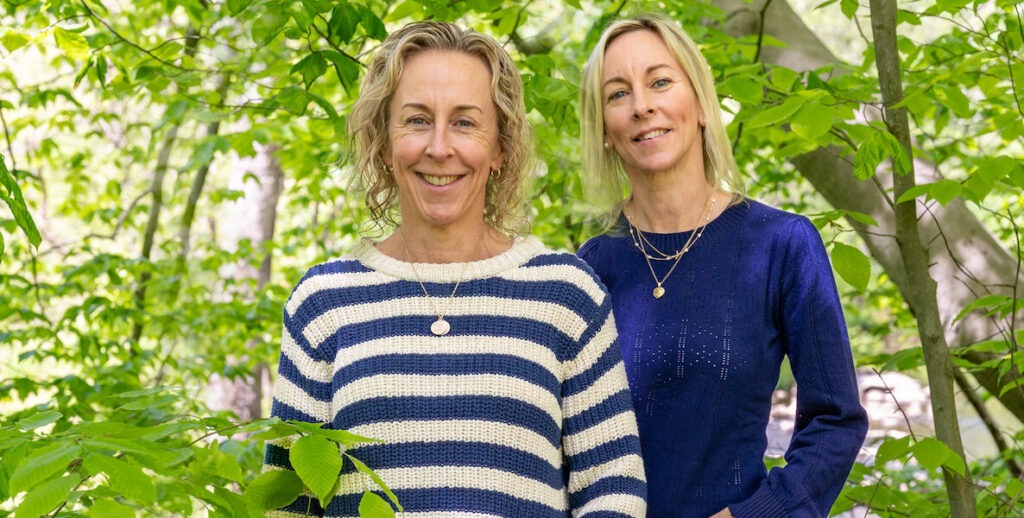Why did Jenn Asplundh always feel grounded and calm when she was near water? Why was it so important for her to have both a pond and fountain on her Bryn Athyn property?
She never really thought about it — maybe it was her zodiac sign, Aquarius — until she interviewed marine biologist Wallace J. Nichols on Kindred, the podcast she and her sister Kate Coffin produce about the relationship between humans and the rest of the natural world.
Asplundh remembers Nichols, author of Blue Mind, a book about the psychological effects water has on humans, “saying, If people can even go to a fountain in your city or whatever … there’s a change in our mental state, in our brain function,” Asplundh says.
Now in its seventh season, the Kindred podcast has connected Coffin and Asplundh with natural experts from around the world: marine biologist Hanne Strager, author of the book The Killer Whale Journals, Sloane Hawes, chief of research and development for the animal welfare organization Companions and Animals for Reform and Equity, and Melanie Vogel, the first woman to hike the Trans Canada Trail, which extends from the Atlantic to the Pacific and Arctic Oceans.
Kindred comes at a crucial time. By the end of the century, 40 percent of species on earth may face extinction — in large part because of human actions. The podcast is encouraging people to reconsider their relationship to the environment, hopefully encouraging people to treat it better.
Founding Kindred
The idea for Kindred came to Coffin during the pandemic. She had loved animals and nature since childhood. As an adult, she worked as a vet tech for the Montgomery County SPCA and ran her own dog collar business for a number of years. When Covid hit, all of the markets where she was selling her dog collars shut down. She spent her days sitting in her favorite blue chair in her kitchen in West Chester reading stories about declining emissions and whales communicating better as cruise ship traffic diminished.
“[There were] so many stories of how quickly the natural world was recovering when humans shut down. It hit me deeply,” Coffin says. “I thought, How can I become another voice in this wave of awareness to heal this planet?”

Asplundh also loves animals and nature, but she spent less time outdoors than Coffin did as a child and didn’t work with animals in her career. She got married young, didn’t go to college, and became a yoga instructor when her kids were little. She quit teaching yoga about 13 years ago when the studio she worked for shut down and pivoted to working as a trainer at an all-women’s gym. She began volunteering with the Schuylkill Center for Environmental Education when her kids grew up and moved out. (Asplundh is married to a member of the Montgomery County family that owns Asplundh Tree Expert Co., one of the nation’s largest privately held companies; she is not affiliated with the company herself).
Though she wasn’t as engaged with nature throughout her life as Coffin, she did have one interest her sister didn’t share at first: podcasts.
“My sister had been on me forever saying, You’ve got to start listening to podcasts, they’re the best,” Coffin says. “I’m like, What’s a podcast?”
“We try to highlight how alike we are to animals and nature. They’re our brothers and sisters on this planet.” — Kate Coffin
So, when the pandemic came around and Coffin had time to start listening to podcasts and think about the environment, both things kind of converged. Why not start a podcast that focused on humans and their relationships to the environment?
“It really came from the heart and ended up in my head. I sat with the idea for probably three months and did a lot of research,” Coffin says.
Naturally, the first person she shared the idea with was Asplundh. The two had long been close and Coffin appreciated the probing, insightful questions her sister asked when they talked with one another. She asked her sister if she would co-host.
“I was just like, Why would I possibly do this? It made no sense on paper,” Asplundh says.
But they cared about each other and Asplundh saw Coffin’s vision for the show. She said she would do it if Coffin found a producer. Coffin knew Kat Gatti, now Kindred’s producer, through her friend Andy. Gatti had worked for him as a script supervisor on a film he was making in Iceland.
She agreed to be Kindred’s producer and they launched the first 10-episode season of Kindred in 2021.
“We have no background in science, or journalism, or podcasting. What we do care deeply about is [having] impacting and beautiful conversations that can shift a narrative, and ignite our minds and our hearts,” Coffin says.
Around the globe or in your backyard
A quick breeze through the Kindred catalog will take you from flamingo watching on the Caribbean Island of Bonaire to anti-poaching work in South Africa to the natural wonders in your own backyard.
In a typical episode, they interview scientists, conservationists and other naturalists about a specific animal or facet of nature. Coffin preps the questions while Asplundh comes in with a general sense of the topic and who they’re talking to. That’s intentional. Coffin lovingly refers to her sister as the show’s peanut gallery. Asplundh is able to ask questions that a listener who hasn’t extensively researched the topic may have. Other podcasts, like the pop culture debunking show You’re Wrong About, also operate in this format where one host conducts a lot of research and the other comes in cold.
“Jenn’s gift is really in the moment asking really good questions that I’m thinking that the listener might also be asking. So I want her to be a bit off the cuff,” Coffin says. “She’s a fantastic conversationalist.”
Locally, they’ve spoken with Matthew Rader, president and CEO of the Pennsylvania Horticultural Society (PHS), and Matthew Ehrhart, director of watershed restoration for Stroud Water Research Center in Avondale, PA. Rader appreciated that the podcast format helped him dig into the complexity of PHS’s work and its intersections with environmental justice.
“It’s probably the best single piece we have, telling the whole story of PHS,” Rader says. “We often find ourselves in the position of people knowing about a specific project or program like the Flower Show or Tree Tenders, and this podcast really gave us a chance to talk about the why and the nuts and bolts because of the long form, format and dialog approach to discussion.”
A horizontal, rather than vertical relationship
When people tend to think about their relationship with animals and nature it can be an exploitative system. We’re the apex predator. The top of the food chain. Asplundh and Coffin hope their show pushes people to think of human’s relationships with animals as a horizontal rather than vertical. It’s called Kindred because they hope we’ll see the natural world as our kin.
“We try to highlight how alike we are to animals and nature, Coffin says. “They’re our brothers and sisters on this planet.”
In addition to encouraging people to take better care of the planet, communing with animals and nature can also have effects on our mental health as well. Studies have found that 87 percent of people have experienced physical or mental health benefits from their bond with animals. Another study found that 92 percent of participants saw improvements in their mental health when they regularly engaged with outdoor environments.
“We are living in a super high technology world right now, and rather than sitting in front of the TV, a lot of people are listening to podcasts, looking at social media. This is how people are getting their information,” says Tracy Wilson, Nevada state director for American Wild Horse Conservation. She appeared on the show in season four.
“There are people who are paying attention. There are people who care. And there are people who are actually taking really positive action to make a difference.” — Jenn Asplundh
“We’re losing that connection with the world, and, quite frankly, without it, we’re going to be in a lot of trouble. I love that their show is everything from wild horses to to watersheds to cheetahs.”
And they’re committed to highlighting smaller initiatives in addition to the work of scientists. In one episode they talk with Dawood Mohammad, founder of Animal Rescue Kashmir. Mohammad is a businessman who started a rescue for dogs, horses and cats as a side project because “he couldn’t stand watching the suffering anymore,” Asplundh says.
“The fact that there are people like that in the world, it’s incredibly hopeful, for me. I think we hear a lot about the bad news, the doom and gloom part of where our planet is and our humanity is. … There are people who are paying attention. There are people who care. And there are people who are actually taking really positive action to make a difference.”
Kindred’s impact
Kindred has about 10,500 listens across platforms. Coffin and Asplundh say the show doesn’t have advertisers. They now have a crowdfunding page on the site Buy Me A Coffee for listeners who want to support the show.
They encourage listeners to donate to nonprofits when guests from those organizations appear on the show — but they don’t set up fundraising pages or track those donations.
For guests, much of the value comes in raising awareness. Not many people know about wild horses, coastal wolves or some of the other creatures Kindred highlights.
“It was really a great opportunity to reach out to a whole new set of people,” Ehrhart, with the Stroud Water Research Center, says. “The watersheds a big place, and it’s easy to feel like you don’t make that big a difference, but it’s the reality sort of is that it’s all of our cumulative actions that affect things.”
The podcast can also reduce myths about much-maligned creatures like insects, which play a critical role in our ecosystem, even if people think they’re creepy and gross.
“If you ask almost any person what they think about bugs, they always say, Creepy. I can kill them on site or I wish we could eliminate all mosquitoes. They’re not even useful,” says Gwendolyn Erdosh, an entomologist who works as an insect discovery lab educator and field assistant for SaveNature.Org and runs the Instagram account Gwentomologist.
“It’s very important to start changing people’s [perceptions], and that’s what I do with my Instagram. That’s what they’re doing with their podcast.”

